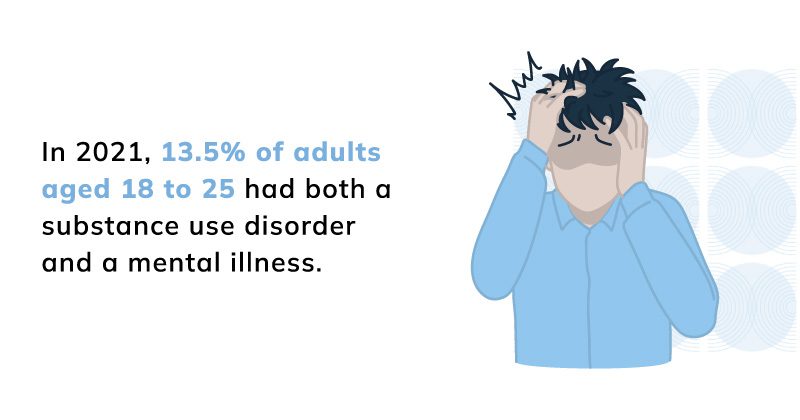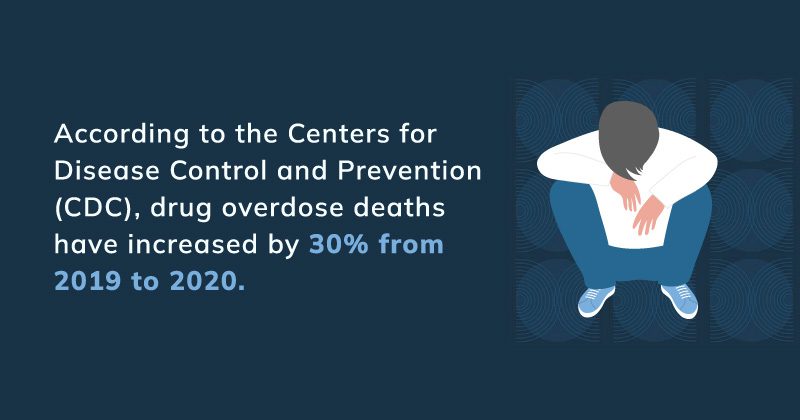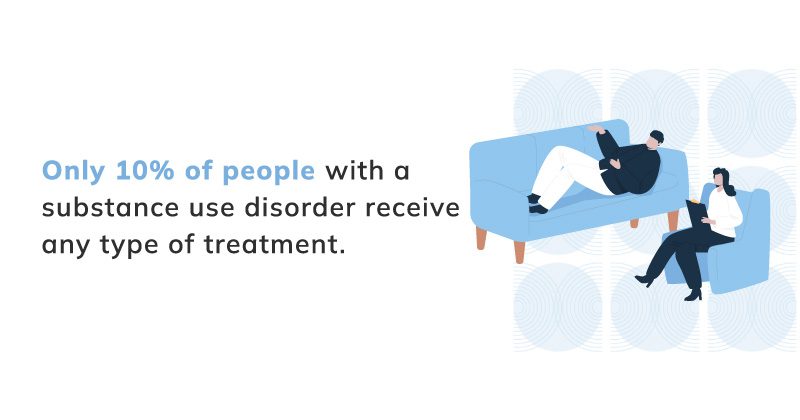What Is Aftercare Rehab, and How Can It Help You Achieve Sustainable Recovery?
Learn how aftercare rehab can provide the support and encouragement you need to succeed in this comprehensive article.

What Is Aftercare?
A recent study found that 40% to 60% of individuals relapse within one year of completing treatment. Aftercare rehab can help individuals maintain a healthy lifestyle after their initial treatment and reduce the risk of relapse.1
It provides structured support immediately after completing primary treatment. The rehab offers intensive counseling, therapy sessions, and resources. The aim is to help individuals establish a strong foundation for long-term sobriety.
How Much Does Aftercare Cost on Average?
The average cost of a three-month outpatient rehab program is around $5,000. However, the actual amount of addiction aftercare rehab can vary depending on several factors.2
For instance, insurance can cover all, a portion, or none of the aftercare rehab costs. Some individuals may need a more intensive aftercare treatment plan, increasing the price. Others may only require the minimum.
It’s important to research different options and find the best fit for your needs and budget. The cost of aftercare treatment may seem high initially. But investing in treatment can lead to better outcomes and lower relapse risk, saving money in the long run.

Why Is Aftercare Rehab an Important Part of the Addiction Recovery Process?
Research shows that individuals who participate in aftercare programs have better long-term outcomes.3 Let’s explore why aftercare rehab is vital for successful addiction recovery:
Reduces the Risk of Relapse
Relapse is a common challenge during the early stages of recovery. Aftercare rehab can help reduce this risk by providing ongoing support and motivation.4
Structured aftercare programs focus on relapse prevention strategies. They help individuals develop coping skills and resilience to triggers and cravings.
Continues the Recovery Process
Addiction recovery is a lifelong process, and aftercare rehab provides a continuation of treatment and support for sobriety.
It allows individuals to reinforce the skills they learned during primary treatment. By applying these skills, people can better navigate challenges and maintain their recovery.
Encourages Psychological Healing
Aftercare treatment addresses various psychological factors that can impact addiction recovery. These factors include:
- Mental health conditions
- Trauma
- Family dynamics
- Employment
- Housing
- Education
Aftercare provides support to help individuals continue to heal mentally and spiritually. It offers resources and help to rebuild their lives and reintegrate into society.
Builds a Support Network
During the recovery process, it is crucial to have a support network. Aftercare rehab programs often involve group therapy and support group sessions.
These sessions provide a space for individuals to share experiences and offer support.
Improves Health and Wellness
Addiction takes a toll not just on the mind but also on the body. Aftercare programs often include components that address physical health and wellness.
Examples may include exercise and nutrition guidance essential to long-term recovery. The aim is to help individuals feel their best as they continue their recovery journey.

How Is Aftercare Rehab Different From Primary Rehab?
Here are the key differences between aftercare and primary rehab:
Aftercare Rehab Follows Primary Rehab
Aftercare rehab serves as continued support for individuals who have completed primary rehab. It aims to help individuals transition back into their daily lives, maintain their recovery, and prevent relapse.
Ongoing Treatment
Primary rehab is typically an intensive program that lasts around one to three months. Aftercare rehab, on the other hand, continues beyond primary rehab.
Depending on individual needs, the program can be ongoing for months or even years.5
Relapse Prevention
Aftercare rehab focuses on preventing relapse by developing a relapse prevention plan tailored to individual needs. These plans involve identifying triggers, strengthening coping skills, and providing ongoing support.
Continued Therapy and Monitoring
Aftercare programs provide ongoing therapy to address any lingering psychological or emotional issues, monitor progress, and make necessary adjustments to the treatment plan.
Regular check-ins, drug testing, and accountability measures may be implemented to support individuals in maintaining their sobriety.
Aftercare Helps Transition Back to Daily Life
Aftercare rehab programs assist individuals in developing strategies for managing triggers and temptations in their daily lives, fostering healthy relationships, and reintegrating into work, school, and their communities.
What Types of Services Are Typically Included in Aftercare treatment?
Various types of services are included in aftercare rehab. Among them are:
Counseling and Therapy
Aftercare programs commonly include individual counseling and therapy sessions. These sessions help individuals address underlying issues and manage triggers and cravings.
What to Expect in Therapy
Continuing Education
Aftercare programs may offer educational sessions. The topics can be related to addiction, relapse prevention, and healthy living. These sessions empower individuals with knowledge and skills to make informed choices.
Vocational Training and Employment Assistance
Aftercare programs may provide vocational training or assistance with job placement. The purpose is to help individuals rebuild their lives and regain financial stability.
Relapse Prevention Planning
Aftercare rehab helps individuals develop personalized relapse prevention plans. These plans identify potential triggers, coping strategies, and emergency contacts. These activities aim to support individuals in maintaining their sobriety.
Medication Management
Aftercare programs ensure proper medication management for individuals receiving medication-assisted treatment (MAT). These services focus on people with an opioid or alcohol addiction history.
What is MAT?
What Are Some Common Aftercare Rehab Programs and Services?
Here are some common aftercare rehab programs and services:
Sober Living Homes
Sober living homes are safe and supportive residences where people in recovery live. In these homes, individuals can practice the skills they learned while receiving support. They follow house rules, attend 12-Step meetings, and often undergo regular drug testing.6
Support Groups
Support groups offer a network of people who understand and share similar experiences. These groups provide a platform for individuals to talk about their struggles and learn from others. Alcoholics Anonymous (AA) and Narcotics Anonymous (NA) are the most popular.
Outpatient Counseling
Outpatient counseling involves regular meetings with a therapist or counselor. These sessions focus on addressing the emotional and psychological aspects of addiction. They help individuals cope with triggers and develop strategies.
Family Therapy
Family therapy addresses the impacts of addiction on the family unit. This therapy aims to improve communication and enhance the overall family dynamic. It helps families understand addiction and develop ways to support recovery.
Holistic Therapies
Holistic therapies focus on treating the individual as a whole by addressing physical, emotional, and spiritual well-being. They help individuals manage stress and develop a balanced and healthy lifestyle.7
Examples can include:
- Yoga
- Meditation
- Art therapy
- Mindfulness practices
How to Select the Right Aftercare Rehab Services
Choosing the right aftercare rehab services is important for long-term recovery. Here are some ways you can determine which services are the best fit for your needs:
Assess Personal Needs
Individuals should consider their specific needs when choosing aftercare rehab services, such as:
- Type of addiction
- Severity of addiction
- Individual preferences
- Prevalence of co-occurring mental health conditions
Seek Professional Advice
Consulting with health care professionals, such as doctors, therapists, or addiction specialists, can provide valuable guidance. They can assess the individual’s situation and recommend suitable aftercare services.
Research Available Options
It’s important to research information about different aftercare rehab services. Individuals and their loved ones can read about various programs. They can also review online resources to understand what each service offers.
Consider Location and Accessibility
The location and accessibility of aftercare services should be taken into account. It’s beneficial to choose facilities that are conveniently located and easily accessible. This ensures regular attendance and participation.
Evaluate Program Structure and Duration
The structure and duration of aftercare programs should align with the individual’s needs. For instance, some may prefer structured daily activities, while others may not.
Assess Cost and Insurance Coverage
Finances play a crucial role in selecting aftercare rehab services. Individuals should check each program’s costs and determine if coverage is available. They can contact insurance providers or program administrators to understand these aspects.
Seek Recommendations and Peer Support
Talking to others who have gone through similar experiences can provide valuable insights. Individuals can seek recommendations from support groups and trusted friends in this regard.
Are There Potential Challenges or Barriers to Accessing Aftercare Rehab? How Can They Be Addressed?
Here are some common challenges and solutions to aftercare rehab:
Affordability and Financial Barriers to Aftercare Rehab
Aftercare rehab can be expensive, making it hard for some people to pay for the services. Also, not all insurance covers the cost of aftercare. As a result, it leaves many without financial help.
To solve this, individuals should ensure coverage with their insurance. The government and non-profit groups also offer monetary help and fully funded programs.
Geographical Barriers to Aftercare Rehab
Aftercare centers may not be available in some places, so people have to travel far for treatment. Transportation can also be a problem, especially for those without reliable transport.
To solve this, many aftercare rehab centers provide telehealth services to reach individuals in remote areas. This can include online counseling, group therapy sessions, or teleconferencing.
Stigma and Social Barriers to Aftercare Rehab
Some people may be scared to seek aftercare rehab because they worry about being judged. Also, if they don’t have support from friends and family, it can discourage them from getting help.
To solve this, aftercare facilities provide various strategies, such as:
- Community outreach programs to dispel myths and reduce the stigma associated with addiction and recovery.
- Support groups or peer mentorship programs that connect aftercare participants with individuals who have successfully reintegrated into their communities.
- Family counseling and involvement that provide education, counseling, and support to help rebuild relationships and address any lingering concerns or conflicts.
Language and Cultural Barriers to Aftercare Rehab
Communication and understanding can be difficult because of language barriers. There may also be challenges that interfere with cultural beliefs.
To solve this, many aftercare centers provide translation services and multilingual staff. The treatment team can also develop programs that meet individual needs and preferences that respect each person’s culture and beliefs.
Lack of Knowledge and Information About Aftercare Rehab
Some people may not know about aftercare rehab or how its services can help them after primary treatment.
To solve this, we need to spread awareness through educational campaigns. A brochure or website that is easy to understand can also bridge this information gap.
How Can Aftercare Rehab Help Individuals Maintain Their Sobriety and Prevent Relapse?
Aftercare programs play a crucial role in helping individuals maintain their sobriety. Let’s explore how they can help individuals in their journey toward long-term recovery.
Continuous Support
Aftercare provides support to individuals after they leave the primary treatment facility. This support helps them stay motivated and committed to their sobriety. Individuals can share their experiences in counseling sessions and group meetings.
Relapse Prevention Strategies
Aftercare services equip individuals with relapse prevention strategies. They learn coping mechanisms to deal with triggers that may lead to substance abuse.
The treatment team tailors relapse prevention plans to each client. This helps individuals avoid relapse by identifying high-risk situations and developing healthy coping skills specific to their needs.
Education and Skill-Building
Aftercare rehab focuses on educating individuals about addiction and the recovery process. This can include:
- Physical and psychological symptoms
- Long-term side effects
- Common triggers
- Coping mechanisms
- Treatment options
Additionally, rehab offers skill-building workshops and activities to manage stress.
Accountability and Monitoring
In aftercare rehab, individuals are held accountable for their actions. Regular check-ins and drug tests help ensure they remain committed to their sobriety.
Knowing they are being monitored can provide a strong deterrent against relapse. Rehab staff encourages individuals to make positive choices and take responsibility for recovery.
Family Involvement
Aftercare rehab recognizes the importance of family support in maintaining sobriety. The program encourages the involvement of family members in the recovery process.
Family therapy sessions help improve communication and rebuild trust. Creating a supportive and understanding environment at home reduces the chances of relapse.
How to Get the Most Out of Aftercare Programs for Addiction
Here are some tips for getting the most out of aftercare programs:
- Attend all scheduled meetings and appointments to stay on track with recovery goals.
- Build a support system with peers to help combat triggers and stressors.
- Be honest and open about struggles and setbacks.
- Stay committed to the program’s principles to build a foundation for lifelong sobriety.
- Take advantage of additional resources, such as therapy and educational workshops.
- Practice healthy habits to improve overall well-being and aid in the recovery process.
- Stay accountable by regularly checking in with a counselor to monitor your progress.
- Avoid triggers and negative influences to protect sobriety.
- Celebrate milestones and accomplishments to stay motivated.
Remember that recovery is a continuous process. Seeking help and support is a strength, not a weakness.

How Can Aftercare Rehab Be Incorporated Into a Comprehensive Treatment Plan?
Aftercare rehab is vital in a comprehensive treatment plan for overcoming substance abuse. It combines primary rehab, medical care, and ongoing support for long-term recovery. Let’s explore how aftercare fits into the treatment plan.
Primary Rehab
Primary rehab is the initial phase in recovery, where individuals receive intensive care. This phase typically involves detoxification, therapy, and counseling.
The aim is to set the foundation for recovery and help individuals break free from substance abuse. This is accomplished by addressing the physical and psychological aspects of addiction.
Medical Care
Medical care is an integral part of the treatment plan. This can involve prescribing medications that reduce symptoms of withdrawal or mental health conditions or addressing any medical issues related to substance abuse.
Integration of Aftercare Rehab
Aftercare rehab is seamlessly integrated into the treatment plan to ensure continuity of care. The treatment team develops aftercare plans based on each individual’s specific needs and goals.
These plans may include regular individual counseling, group therapy, and support group sessions. It may also involve participation in activities aimed at promoting healthy lifestyle choices.

Choose Choice House Colorado for Addiction Treatment
A good treatment center can make all the difference to your long-term recovery from addiction. Choice House offers high-quality care for substance abuse and co-occurring disorders.
Our team of experienced professionals provide men with personalized treatment plans. Our plans are designed to address the unique needs of each individual.
Treatment Opportunities Offered at Choice House
We understand that addiction is a complex disease, so our programs incorporate a variety of therapies, such as:
- Cognitive behavioral therapy (CBT)
- Dialectical behavior therapy (DBT)
- Art therapy
- Experiential therapy
- Family system approach to treatment
- Motivational interviewing (MI)
What is CBT?
Contact Us Today to Get Started
At Choice House, we believe in creating a supportive and welcoming environment. We want our patients to feel safe and empowered to begin their healing journey.
Our team of experts is dedicated to helping clients achieve lasting recovery. If you’re ready to reclaim your life, choose Choice House for compassionate and effective addiction treatment.
Resources
- https://nida.nih.gov/publications/drugs-brains-behavior-science-addiction/treatment-recovery
- https://drugabusestatistics.org/cost-of-rehab/
- https://www.ncbi.nlm.nih.gov/pmc/articles/PMC7813220/
- https://www.ncbi.nlm.nih.gov/books/NBK64815/
- https://www.ncbi.nlm.nih.gov/pmc/articles/PMC4007701/
- https://www.ncbi.nlm.nih.gov/pmc/articles/PMC3057870/
- https://www.healthline.com/health/mental-health/holistic-therapy
Questions About Treatment?
This could involve increased secrecy, defensiveness, or changes in normal routines or interests.
